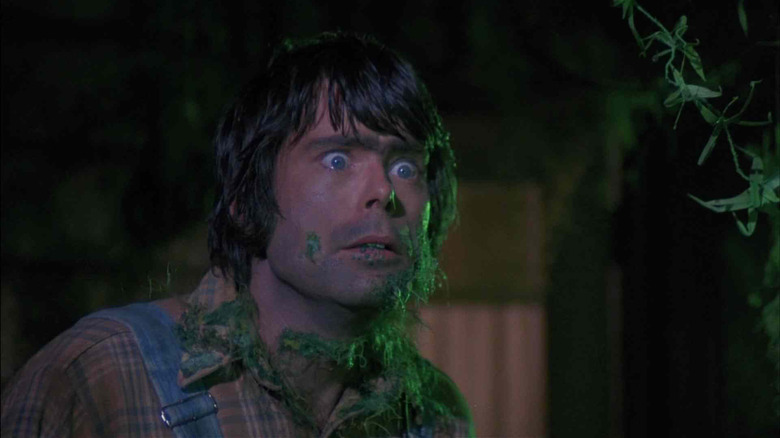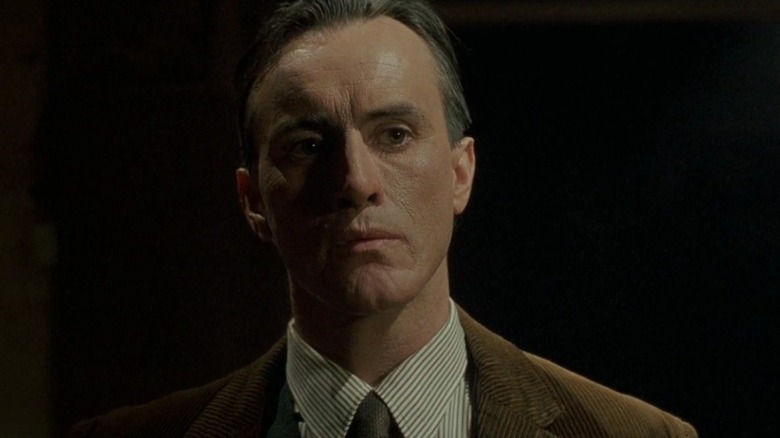The Best Horror Fiction Writer Of All Time, According To Stephen King
Stephen King has a wide taste in literature, loving novels like "Lord of the Flies" and "Watership Down" over horror literature and weird fiction, but that's not to say he doesn't pay attention to other masters of the genre. The bulk of King's novels are horror stories, and he clearly took a lot of inspiration from the pulp horror, genre magazines, and EC Comics of his childhood. Indeed, King wrote "Creepshow" in 1982, openly paying homage to the "Tales from the Crypt" and "Shock SuspenStories" issues he read as a youth in the 1950s. King wears his horror influences on his sleeve.
As for the literature that inspired him, King recalls reading a lot as a child, and that he loved a wide variety of books. He enjoyed the fantastical stories of Ray Bradbury, the Nancy Drew mysteries of Carolyn Keene, and, yes, even horror novels like Robert Bloch's "Psycho." He has a special affinity for the 1956 novel "The Shrinking Man" by Richard Matheson, later adapted into the excellent "The Incredible Shrinking Man" feature film. King also revealed in an introduction he once wrote for William Golding's "Lord of the Flies" that the book changed his perception of literature after it was recommended to him by a bookmobile driver. It was, as King said, a book that depicted children as they actually are. "It's not just entertainment," he wrote, "it's life or death."
King also spoke about his love for 1950s EC Comics in an interview. He cited William Gaines' salacious horror rags as infecting his brain and drawing him toward horror at an impressionable age, along with a lot of the movies he was watching at the time. He loved "Creature from the Black Lagoon" and "The Brain from Planet Arous" with a passion, all while sneaking in Bradbury, Bloch, and his favorite, H.P. Lovecraft.
H.P. Lovecraft
Speaking on his favorite childhood horror books, King said:
"In terms of reading, the early Bradbury played a part (although I did not discover him until my teens), the early Bloch, and a number of '40s paperback editions of Lovecraft that I found in an aunt's attic. Lovecraft struck me with the most force, and I still think, that for all his shortcomings, he is the best writer of horror Fiction that America has yet produced."
Which is high praise, and one can certainly take that as a recommendation to seek out the short stories of H.P. Lovecraft.
Lovecraft, for those unfamiliar, was a reclusive author from Providence, Rhode Island, which isn't too far from King's hometown of Portland, Maine. When Lovecraft was still a toddler in 1893, his father was institutionalized, and he lived with his mother until she, too, was institutionalized when he was 29. He ended up living with aunts he hated. As an adult, Lovecraft wrote essays and short stories for various local magazines, and became involved with the local fantasy writer community in the 1920s. He rarely left his house, and after a stint in New York, returned to Providence to author the tales he would become best known for, notably, the stories in what has come to be known as the Cthulhu mythos. "Cthulhu" is meant to be unpronounceable, sounding like a combination of a guttural cough and the words "clue-lou."
Lovecraft had a bleak, dismissive, almost Kafka-like view of the futility of humankind. Many of his stories involved mad cults summoning ancient space deities to reclaim the Earth. Human beings, he noted, were but specks of imperceptible life on a planet that was once ruled by creatures so large and strange, human beings would go mad just to look at them. He created a whole panoply of ancient deities, each one more terrifying than the last. Cthulhu was among them.
The above photo is actor Jeffrey Combs playing Lovecraft in the 1993 anthology film "Necronomicon."
Lovecraft, the media giant
Additionally, Lovecraft had a mastery of a certain kind of classic prose that inflames the mind, and encourages reading out loud. Lovecraft was inspired by Poe, but one can also make a comparison to the later works of Vladimir Nabokov. Both authors loved to roll the English language around in their mouths.
Unlike Nabokov, however, Lovecraft remained obscure throughout his life, and never achieved mainstream success. Other authors championed his work — notable August Derleth — but he died alone at the age of 46 of colon cancer. His extant works have since been gathered into numerous easy-to-find anthologies.
Because of his flowery prose and interest in the fantastical, Lovecraft eventually became a darling of teenage nerds everywhere. His works became the basis for salacious monster movies (Stuart Gordon's films "Re-Animator" and "From Beyond" are based on Lovecraft stories), and one cannot enter a board game shop without tripping over 30 games extrapolated from Lovecraft's work. Heck, enterprising horror hounds can even buy Cthulhu plushies at Comic Cons and pop culture shops. Lovecraft is well known in the geek community, and is a minor media empire unto himself.
King also mentioned that Lovecraft had shortcomings, and he's likely referring to Lovecraft's brazen and open racism. Lovecraft sometimes included racist language in his story details about how non-white people are lesser human beings, and he named his cat ... well, look that up on your own. He was also sexist, and included almost no female characters in any of his stories. He was a bitter, hidden man with bleak ideas and a heart full of hate. His verbose, shadowy stories of creatures and madness are also exhilarating to read. King isn't the only author to have been inspired by Lovecraft.


